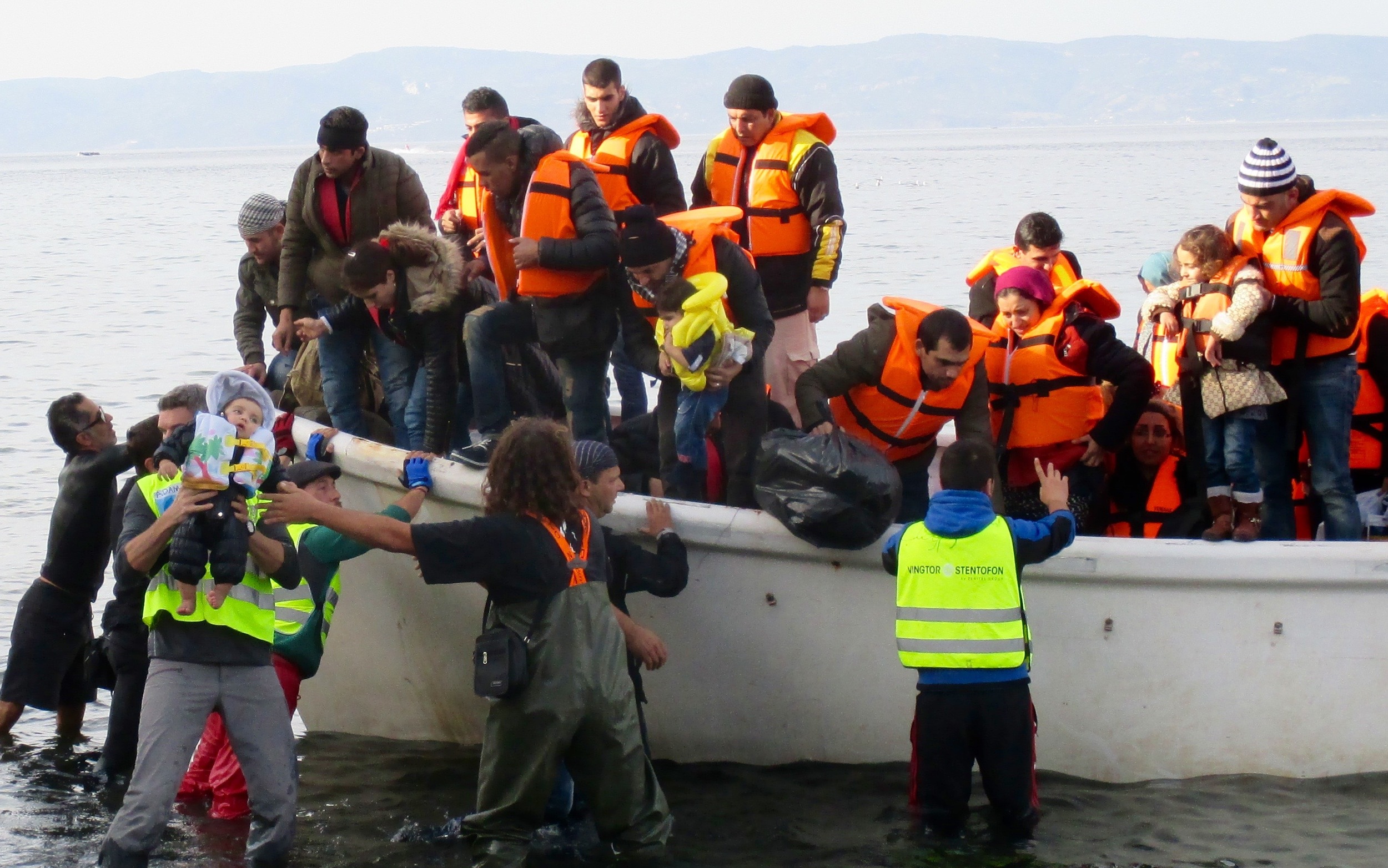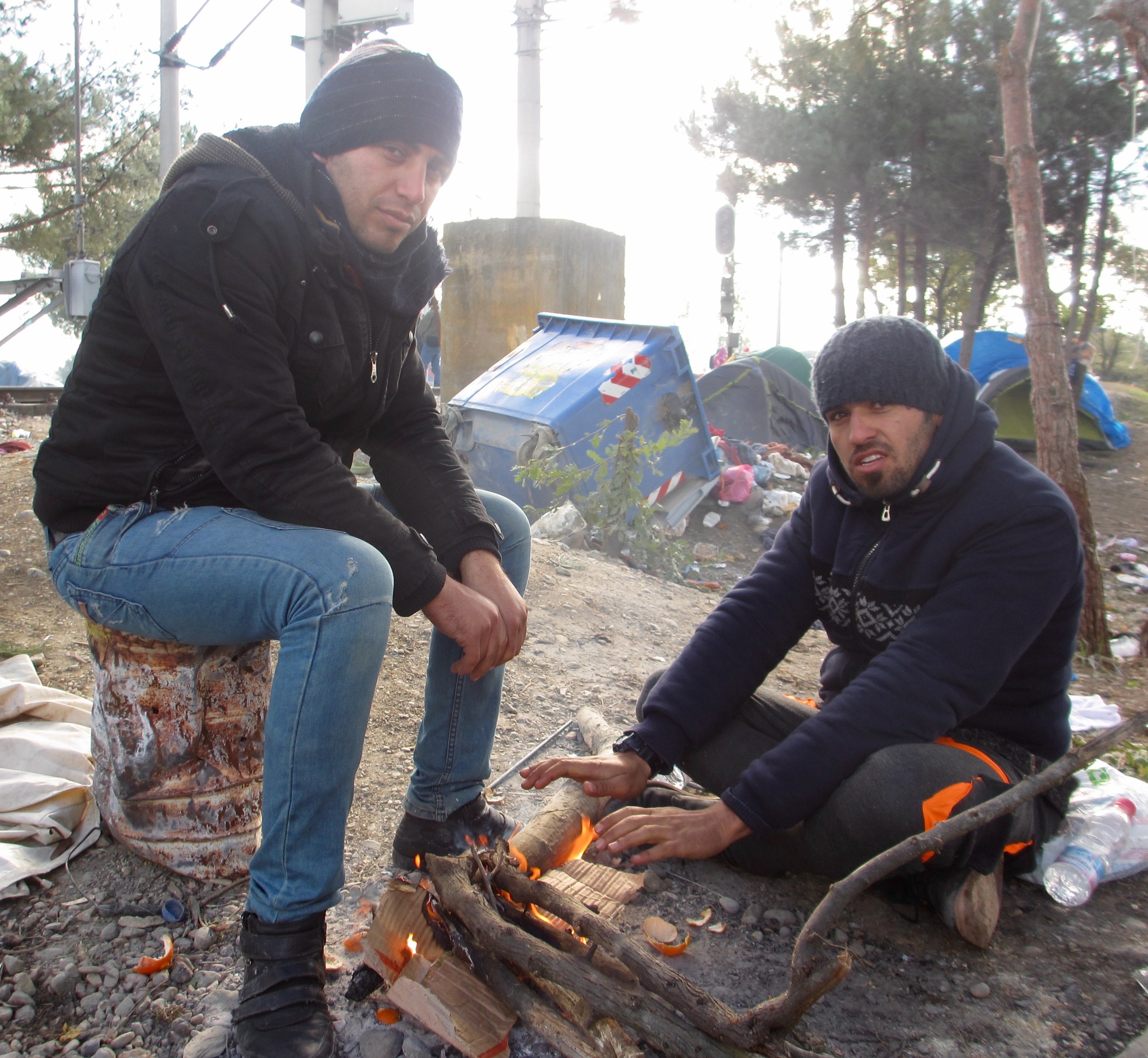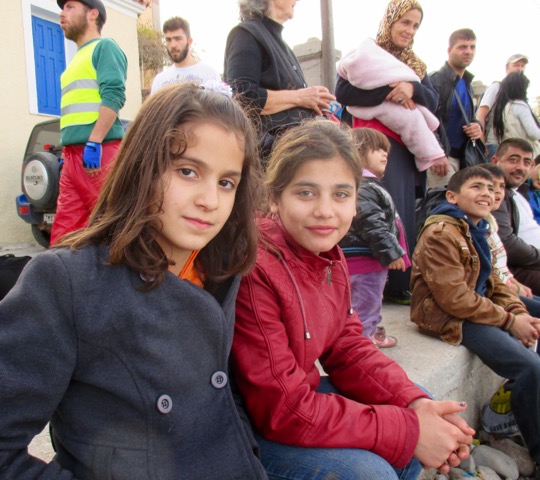Refugees become trading chips in EU-Turkey negotiations

On March 7th, European and Turkish leaders announced a breakthrough in agreeing to a framework for a possible deal on managing the flow of refugees and migrants arriving from Turkey onto Greece’s shores. If the framework is implemented as it has been presented, it appears that the deal would strike a major blow to refugee rights. Currently, a humanitarian catastrophe is unfolding in Greece, with deteriorating conditions for refugee arrivals who are attempting to transit through the country. European leaders and international actors should focus attention and resources on protecting and assisting refugees and asylum seekers, not trading away their rights in the hopes of preventing new arrivals.
A key aspect of the proposed deal calls for all refugees and migrants who arrive in Greece from Turkey irregularly via the Mediterranean route to be returned to Turkey. For every Syrian readmitted to Turkey from Greek islands, another Syrian refugee already in Turkey will be resettled to a European Union member state. Readmission of irregular migrants can and does occur, however, particular status determination procedures are meant to be afforded to asylum seekers, and nothing in the current framework provides comfort that those procedures will be followed. In response to the proposed deal, Vincent Cochetel, the UN Refugee Agency’s European regional director, stated, “The collective expulsion of foreigners is prohibited under the European Convention of Human Rights. An agreement that would be tantamount to a blanket return of any foreigners to a third country, is not consistent with European law, is not consistent with international law.”

The bottom line is that refugees and asylum seekers – who have experienced unspeakable horrors in war-torn countries – are not being treated as human beings, but rather as trading chips in a game of high stakes deal-making.
In 2015, over one million refugees and migrants crossed the Mediterranean Sea to Europe, the vast majority fleeing war and persecution in Syria, Afghanistan, and Iraq. Those refugees are now caught in the crossfire of geopolitical negotiations between the EU and Turkey. For their part, EU member states want to stem the movement of refugees into the continent. In return for halting their progress, Turkey is seeking a financial payout (upwards of 6 billion euros), a restart of EU ascension talks, and visa-free travel for Turkish citizens visiting Europe. The last piece may be a sticking point for several European countries. The bottom line is that refugees and asylum seekers – who have experienced unspeakable horrors in war-torn countries – are not being treated as human beings, but rather as trading chips in a game of high stakes deal-making.
Last November, an RI team deployed to Greece to meet first-hand with refugees arriving by boat from Turkey. The scene on the island of Lesvos, where most come ashore, was like nothing I have ever encountered. During one day on the island’s northern shore, around 60 rubber dinghies, brimming with people, landed on the rocky beaches. We met a group of men from the Kurdish region of Iraq; a large family from Syria that included young children, parents, and grandparents; a mother and her child traveling together from Afghanistan; and countless others from places such as Iran, Kenya, and Pakistan.

When we asked people how they felt, the overwhelming answer was joy at finally arriving in Europe and relief that they had extricated themselves from the control of smugglers in Turkey whom they had to pay to facilitate the journey. There was also a great deal of confusion. Dedicated volunteer groups and aid organizations had set up transit sites where newly-arrived migrants could change into dry clothes, receive a hot meal, and board a bus to the island’s capital city, Mytilini. There, refugees registered with Greek authorities and then purchased ferry tickets to Athens – if they could afford it – for onward travel toward western Europe. Most of those I spoke with said that they wanted to go to Germany because they believed that refugees would be welcomed there and that jobs might be available. Others wanted to go places like Sweden in the hopes of joining relatives who had previously made the journey.
Over 90 percent of those arriving on Greek shores from Turkey are from Syria, Iraq, or Afghanistan – countries where conflict continues to rage.
However, upon arrival to Lesvos there was a lack of assistance – including interpreters – to direct people toward transit sites and to explain what their options were. While driving down to the shore, we encountered an Iraqi man sitting on the side of the road, completely exhausted. He thought that he had to walk the 70 kilometers to Mytilini but had no idea that there was a transit site only 200 meters around a bend in the road. Many refugees arrive with smart phones, and aid groups have teamed with internet companies to create websites with information on where to access services, such as how to buy ferry tickets to Athens. Nonetheless, the situation upon arrival is chaotic.
Importantly, Greece is itself in the midst of economic crisis and has a demonstrated lack of capacity and resources to respond to the thousands of daily arrivals on its shore. As boat after boat came ashore on Lesvos, there was a notable absence of any Greek authority. According to aid officials, there are only a handful Greek police assigned to the northern part of the island and just two or three working ambulances. In order to fill the gap, UNHCR has expanded its capacity over the past year and strengthened its coordination role. Also, an increasing number of international organizations are now present and responding to the crisis.
To his credit, the mayor of Mytlini has promoted an open and welcoming environment for refugees, but his office is stretched beyond belief. The municipalities that are on the frontline of the response could benefit from increased financial and technical support – either from the Greek central government or even directly from the European Commission, as well as from UNHCR.
The relief and joy that is expressed by refugees upon arrival in Lesvos is in stark contrast to the frustration and despair that many experience at Greece’s northern border with the Former Yugoslav Republic of Macedonia (hereafter referred to as Macedonia).


Throughout most of 2015, refugees and migrants passed relatively quickly through the border crossing at the town of Idomeni and continued their journeys to countries like Germany and Sweden. Just as we were arriving in Greece in late November, however, Macedonia, in alignment with several Balkan and other neighboring countries, implemented a partial closure of its border. Refugees from Syria, Iraq, and Afghanistan could still cross, but asylum seekers and migrants from all other countries were stopped.
The decision to confer rights purely based on nationality and deny the movement of others without examining their potential claims for protection has created an acute humanitarian crisis at Greece’s northern border.
A makeshift camp quickly developed at the border as around two thousand people amassed in Idomeni. We met refugees from war-torn countries like Somalia and Yemen whose emotions vacillated between frustration and complete despondence at the possibility that their journey had been stopped and the uncertainty of their options going forward. Temperatures dropped below freezing and aid workers scrambled to provide basic necessities like food and warm shelter. The air filled with toxic fumes as people huddled around small fires and burned anything they could find, including plastic bottles, to stay warm. The decision to confer rights purely based on nationality and deny the movement of others without examining their potential claims for protection has created an acute humanitarian crisis at Greece’s northern border. Soon after, Greek police moved into the area, cleared the camp, and bussed those stuck at the border back to Athens.
Since our visit in November, the crisis in Greece has continued and in some ways even intensified. Despite rough winter seas and news about border closures along the Balkan route, around 150,000 refugees and asylum seekers have crossed the Mediterranean from Turkey over the past two and half months. Tragically, 448 people have died or been lost at sea during this period.

In 2015, the majority of travelers were men – many of them husbands, fathers, and brothers hoping to settle safely in Europe before the rest of the family made the journey. Today, according to Unicef, about 60 percent of those packing onto boats bound for Greek shores are women and children, most of them seeking to reunite with other family members already in Europe. Several countries, including Germany and Denmark, have increased restrictions on family reunification and some have fully suspended the process for several years. The measures are part of an effort to deter movement toward Europe, but the policies appear to be adding to the urgency of making the journey now, lest the restrictions become even more severe in the future. People with whom I spoke in Greece told me they were not deterred by news of border closings to the north, on the contrary, the imposition of restrictions caused a “now or never” attitude among some.
Despite the clearing of the camp at Idomeni in November and increased border controls, people continue to move toward the border crossing, where around 12-14,000 people have amassed. The conditions for them are horrific, with people sleeping out in the rain and mud, toilets overflowing, and the public health situation deteriorating. Last month, Austria and nine Balkan countries, including Macedonia, and without including Greece in the talks, agreed to a policy of only allowing Syrians and Iraqis to enter their territories. It is troubling that Afghans were taken off the list of those eligible for crossing the borders despite the fact that conflict in Afghanistan rages on, with 2015 marking the deadliest year for civilians since the U.S. invasion in 2002. And just this past weekend, several countries along the Balkan route closed their borders to all asylum seekers.
As a spokesman for UNHCR stated, “We are seeing human misery at its peak in Europe. These conditions here at the Idomeni border site are just unlivable.” An aid worker in Idomeni recently explained to me that the restrictions will likely cause people to consider hiring smugglers to facilitate movement across the closed borders, thus pushing people underground and putting theme at the mercy of a criminal network.
Measures should be taken to expand safe and legal pathways for seeking asylum, and thereby reduce incentives for refugees to make dangerous boat trips or to put their lives in the hands of smugglers.
Last year, the European Council agreed on a process for refugees to be relocated to another European country upon arrival in Greece (and also Italy), but the effort is under-resourced, slow, and many refugees are not even aware that it exists. Further, there has been a reluctance on the part of a number of EU states to participate fully in the scheme, and since last year, only a few hundred asylum seekers have taken advantage of the program.
Any blanket return of people to Turkey upon arrival on European shores, without examining individual claims, violates the basic tenets of refugee protection and must not be included in any agreed-upon deal.
If such a program is to work, the EU must properly fund and staff its efforts, and EU member states must be willing to receive an expanded number of relocated refugees. Further, family reunification efforts must be augmented, rather than restricted. As we are witnessing, families will take great risks to unite in spite of deterrence policies. Other policies, such as offering a greater number of humanitarian visas, as well as significantly augmenting the number of refugees resettled worldwide can also make a difference. As a creative example, Canada recently reached its goal of resettling 25,000 Syrian refugees, in part, by utilizing a long-standing public-private partnership scheme whereby private individuals, foundations, and churches team with the government to sponsor and support the resettlement of refugees.
To be clear, it is legal for economic migrants arriving in Europe to be returned home if they do not meet the criteria for asylum and/or refugee status. However, at present, over 90 percent of those arriving on Greek shores from Turkey are from Syria, Iraq, or Afghanistan – countries where conflict continues to rage. Any blanket return of people to Turkey upon arrival on European shores, without examining individual claims, violates the basic tenets of refugee protection and must not be included in any agreed-upon deal.